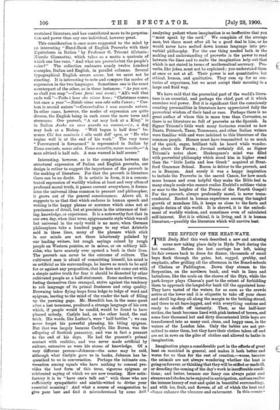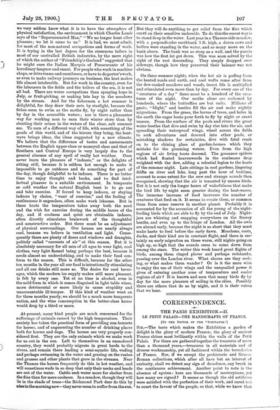THE EFFECT OF THE HEAT-WAVE.
THE Daily Mail this week described a new and amusing scene now taking place daily in Hyde Park during the hot weather. Before the last carriage has left, taking its fair owners back to dress for dinner, thousands of small boys flock through the gates, hot, ragged, grubby, and emphatic, after grilling all the afternoon in the Board-schools of Chelsea or Paddington. Down they stream to the Serpentine, on the northern bank, and wait in lines and battalions, like the souls on the shores of the Styx, while the park-keeper plays Charon's part to the extent of forbidding them to approach the longed-for bank till the appointed hour. They have tasted of the waters, for as soon as the crowds arrive at the lower end it is etiquette to take off your shoes and stroll leg-deep all along the margin to the bathing strand, and there to sit bare-legged, and with everything undone and ready to shuffle off instantly. Then, as the half-hour strikes, the bank becomes lined with pink instead of brown, and some four thousand hot and dirty discontented little boys are transformed into as many cool, clean, and happy ones, in the waters of the London lake. Only the babies are not per- mitted to enter them, but they have their clothes taken off and are set in rows on the piles of clothes and allowed to bathe in imagination.
Imagination plays a considerable part in the effects of great heat on mankind in general, and makes it both better and worse for us than for the rest of creation,—worse, because the animals are not always wondering whether the heat is going on for ever, or thinking that they will be stifled or made ill, or dreading the coming of the day's work in insufferable condi- tions; and better, because our fancy can always paint cool streams and shades, to be enjoyed in anticipation, and can realise the intense luxury of rest and quiet in beautiful surroundings, and with ice, fruit, and flowers, of all of which the heat and ailence enhance the nleasure and eniovment. In this empty.'
we very seldom know what it is to have the atmosphere of physical satisfaction, the environment in which Charles Lamb says of the "Superannuated Man," "We no longer hunt after pleasure; we let it come to us." It is bad, we must admit, for most of the non-natural occupations and forms of work. It is trying in the last degree for the strenuous toilers in most of our unrivalled British industries, by the mere sight. of which the author of "Friendship's Garland" suggested that he might cure the Italian Marquis of Pococurante of his hereditary languor and ennui. For people who work in machine shops, or drive trams and omnibuses, or have to do porter's work, or even to make railway journeys on business, the heat makes life almost intolerable. But for work in the country, even for the labourers in the fields and the toilers of the sea, it is not all bad. There are worse occupations than spraying hops in July, or fruit-picking, or making late hay in the meadows by the stream. And for the fishermen a hot summer is delightful, for they draw their nets by starlight, because the fishes seem to swim as the moths fly, by night rather than by day in the accessible waters ; nor is there a pleasanter way for working men to earn their winter store than by shooting their seines in the waters of the clear, salt summer sea. To men of a different way of life, with something of the goods of this world, and of the leisure they bring, the heat- wave brings ideas, the ideas suggested by a new climate. We believe that the difference of tastes and amusements between the English upper class or moneyed class and that of Southern and Central Europe is very largely due to the general absence of any spell of really hot weather. Ours never learn the pleasure of "indoors," or the delights of sitting still, because it is seldom hot enough to make it impossible to go outdoors and do something for part of the day, though delightful to be indoors. There is no better time to enjoy thought and books, and to find intel- lectual pleasure in a suitable environment. In temperate or cold weather the natural English bent is to go out and take exercise. If forced to keep indoors, or staying indoors by choice, "want of exercise," and the feeling of restlessness it engenders, Often make work irksome. But in these heats the temperature takes away both the need and the wish for exercise during the middle hours of the day, and if coolness and quiet are obtainable indoors, often directly stimulates brainwork of the thoughtful and eonstructive order. But there must be an adjustment of physical surroundings. Our houses are nearly always cool, because we believe in ventilation and light. Conse- quently there are plenty of doors and windows and draughts, politely called "currents of air" at this season. But it is absolutely necessary for all men of all ages to wear light, cool clothes, very light flannel being perhaps the best, because it needs almost no underclothing, and to make their food con- form to the season. This is difficult, because for the other ten months in the year all our food is intentionally stimulating and all our drinks still more so. The desire for cool bever- ages, which the modern ice supply makes still more pleasant, is felt by every one. Yet at no time is alcohol, even in the mild form in which it comes disguised in light table wines, more detrimental or more likely to cause stupidity and unaccountable ill-temper. If this kind of weather went on for three months yearly, we should be a much more temperate nation, and the wine consumption in the better-class house would drop by a third or more.
At present, many kind people are much concerned for the sufferings of animals caused by the high temperature. Their anxiety has taken the practical form of providing sun-bonnets for horses, and of augmenting the number of drinking places both for horses and dogs. The horses are very properly con- sidered first. They are the only arimnls which we make work for us out in the sun. Left to themselves in an unenclosed country, they would probably migrate in great herds to the rivers, and remain there leading a semi-aquatic life, wading and perhaps swimming in the water and grazing on the rushes and grasses and other plants that grow in the streams. Near the Thames the horses frequently do this in hot weather, and will sometimes wade in so deep that only their necks and heads are out of the water. Cattle seek water more for shelter from the flies than for mere coolness. In a meadow, though they will lie in the shade of trees—the Richmond Park deer do this by nine inthe mornin,g now—they never seem to suffer from the sun. But they will do anything to get relief from the flies which crawl on their sensitive underside. To do this the surest way is to stand deep in the water. Last year in a Thames-side meadow, with a perpendicular earthbank 5 ft. high, a dozen cows and heifers were standing in the water, and as many more on the bank above. The bank was as steep as a wall, and the puzzle was how the first lot got down. This was soon solved by the sight of the rest descending. They simply dropped over sideways, though how they preserved their balance was not obvious.
On these summer nights, when the hot air is puffing from the heated roads and earth, and cool wafts come after from the dew-soaked meadows and woods, insect life is multiplied and stimulated even more than by day. For every one of the "creatures of a day" there must be a hundred of the crea- tures of the night. Our moths alone are reckoned by hundreds, where the butterflies are but units. Millions of gnats, "blight," and beetles fill the air and make nightly migrations. From the grass, the leaves of trees, and holes in the earth the eager hosts pour forth to fly by night or crawl unseen. From the surface of the pools and rivers the great water-beetles that dive and swim by day rise into the air, and spreading their waterproof wings, wheel across the fields to seek adventures and descend into other pools, or mistaking shadows for certainties, dive with fatal crash on to the shining glass of garden-houses which they mistake for the gleaming waters. Even from the high regions of air living hosts descend. The gossamer spiders which had floated heavenwards in the sunbeams drop weighted with the dew, adding a Celestial legion to the hosts of the summer night. Late sittings in cool gardens, lingering drifts on river and lake, long past the hour of bedtime, account to some extent for the new and strange sounds then recognised, showing that the air is tenanted by unseen birds. But it is not only the longer hours of wakefulness that make the bird life by night seem greater during the heat-waves. The immense increase of food increases the number of creatures that feed on it It seems to create them, or summon them from some reserve in another planet. Probably it is accounted for by the accession of all the young of the night- feeding birds which are able to fly by the end of July. Night- jars are whirring and snapping everywhere on the Surrey heaths, and even up to the fringe of London. All the owls are abroad early, because the night is so short that they must make haste to feed before the early dawn. Moorhens, coots, ducks, and their kind are in constant flight, and there is cer- tainly an early migration on these warm, still nights going on high up, so high that the sounds seem to come down from among the stars. The writer this week heard great flights of birds, among them ringed plover and perhaps redshanks, passing over the London river. What shores are they seek- ing, or what makes them wander ? Or is it the mere wish to enjoy the use of their wings and the unequalled power it gives of entering another zone of temperature and cooler regions of air ? It is known and seen that many birds fly by day for the mere pleasure of sailing in the skies. Possibly there are others that do so by night, and it is their voices that we hear.



































 Previous page
Previous page